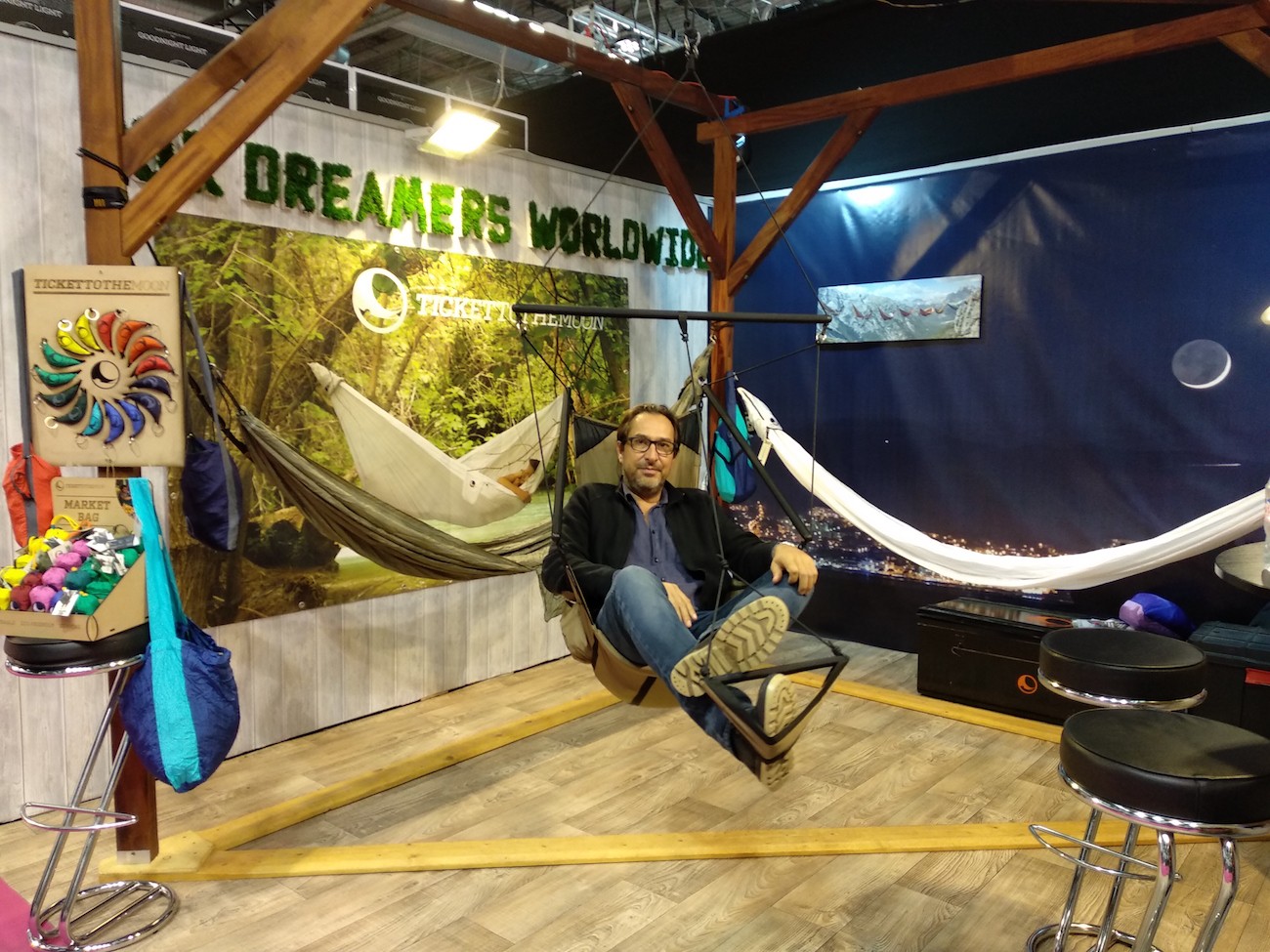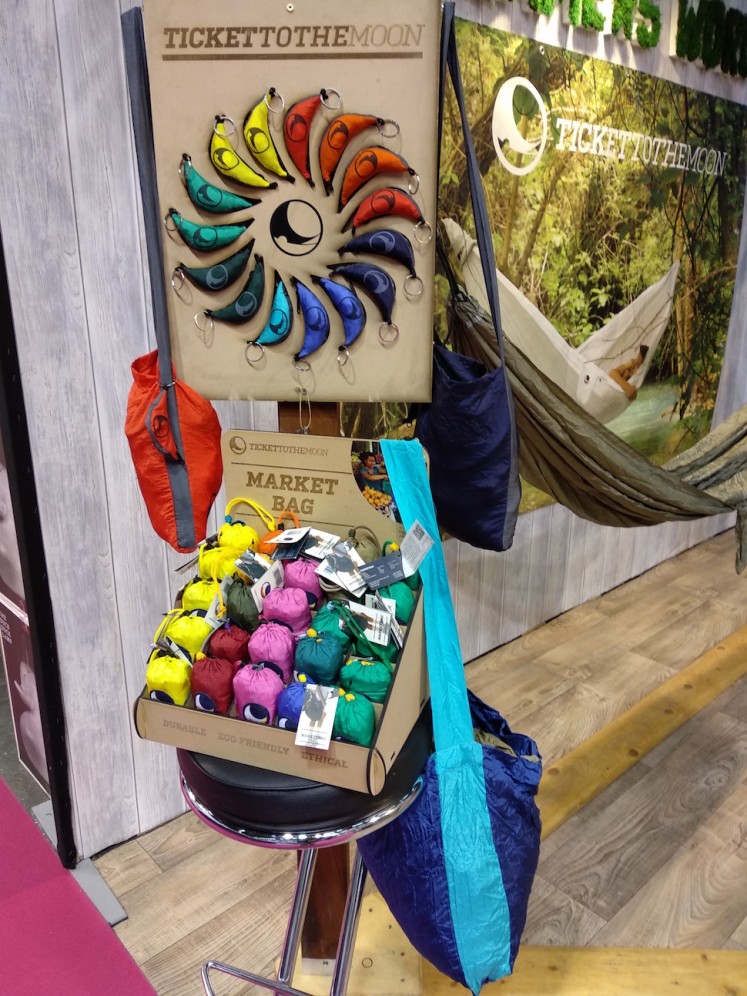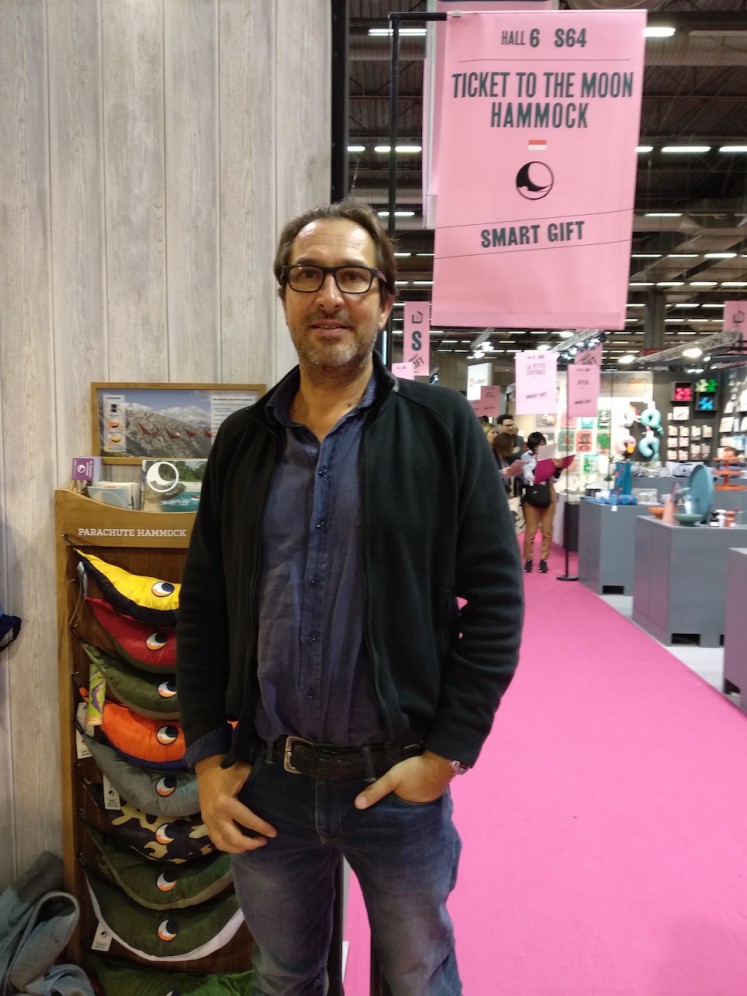Popular Reads
Top Results
Can't find what you're looking for?
View all search resultsPopular Reads
Top Results
Can't find what you're looking for?
View all search resultsFrench founder strives to elevate Indonesian brand at Maison&Objet
Change text size
Gift Premium Articles
to Anyone
A
mong the many European-flagged booths in Hall 6 of the giant interior design trade show Maison&Objet that kicked off in Paris on Friday, the “Smart Gift” themed booth S64 stood out with its Indonesian flag.
One visitor asked the founder and CEO of the Ticket To The Moon brand occupying the booth, 50-year-old French Charles “Charly” Antoine Descotis: “Are you Indonesian?”
“No, I’m French,” said Charly, smiling.
“But this is an Indonesian brand?” asked the visitor again.
“Yes,” Charly answered proudly. “We are based in Bali.”
Established in 1996, Ticket To The Moon (TTTM) was born out of Charly’s passion as a backpacker. He has been fond of hammocks since he was a child – he often used to fashion them out of his father's old straw nets. He landed in Indonesia when he was 28 years old, exploring Java and Bali.
“I really fell in love with Bali and its lifestyle. I wondered, what could I do in Bali [to make a living there]? I had no money and couldn’t even speak English or Indonesian,” he told The Jakarta Post at the show on Friday.
The eco-friendly market bag, which comes with a 10-year guarantee, is among the products shown at the Ticket To The Moon booth at Maison&Objet January 2018. (JP/Keshie Hernitaningtyas)During his trip to India two years earlier, when he was living the ‘hippy life’ with other backpackers, he bought some polyester fabric and made himself a hammock for protection against insects and dirt. Later in Bali, he went to a fabric shop in Denpasar and discovered a very strong parachute nylon made by PT Kahatex in Bandung.
“I tried to use it as a hammock. Not only is the fabric very strong, it is also lightweight, breathable, elastic, anti-mildew and resistant.”
After deciding to produce some hammocks using the parachute nylon, Charly, who has no formal background in design, then started selling them in Europe during his visits to music festivals, fairs and street markets all over the continent. They sold out in just a month and people started to ask him to make the hammock for them.
“The hammocks were initially just a way for me to travel; for me to be able to buy my tickets, pay for my food. I didn’t mean for it to become a business,” Charly said.
Read also: Going global still a challenge for local interior design companies
When he returned to Indonesia, he decided to trademark the brand and opened his first shop in Bali in 1998, and later a home factory in 2000. The company moved its production to a real factory in 2002 and later opened a 1,500-square-meter factory in 2014 that boasts optimal process solutions and working conditions.
Among the products the brand has released are the Moon Chair, the Mini Moonchair, hammocks in five different sizes, the Pocket Frisbee made from cutting waste, the Mosquito Net and an aluminum carabiner. It is said to be the world leader in the parachute travel hammock market, which makes up 80 percent of the company's sales.
As the company is also eager to be a zero-waste manufacturer, it launched new products in 2007, such as the beach blanket and a line of eco-friendly bags. It is also striving to become socially responsible, and since 2006 has been providing aid to the Kodi tribe in Southwest Sumba regency, Sumba Island, East Nusa Tenggara, to improve their living conditions while preserving their culture. The effort was later conducted officially through the TTTM Foundation established in 2009 to run aid programs in health, culture, education and development for the tribe in Mandorak county.
“I currently have 200 people working at the factory. They’re not only Balinese, but also Sumbanese, Javanese,” he said, adding that he had received no support from the government nor the local administration.
“As a foreigner, it’s difficult to develop the business; without any bank support and with all the administrative and legal documents. I could manufacture the products in China, but I don’t want to. These people are not just my employees. Some have been working for me for 20 years. All the managers have been working for me since we started the company.”
Since he still gets the materials from Bandung-based PT Kahatex, he hopes to open a new factory in the West Java capital city. “It will mean less transport, and we will be more green as we are striving to be a sustainable company, zero waste.”
He added, “It would be nice to have some support from the Indonesian government, especially so we can extend our activities and develop exports. I believe we are the only Indonesian brand that is a leader in this market, exporting worldwide. When we go to International exhibitions, we are the only company from Indonesia.”
Read also: Lim Masulin, bringing Indonesia's weaving craftsmanship to the world stage
Currently, Europe remains TTTM’s biggest market, accounting for around 65 percent of its business. Followed by the United States with 10 percent – all through online sales -- and Indonesia with just 5 percent.
Although TTTM regularly participates in outdoor exhibitions in Indonesia and all over the world, this is the first time they have gone to Maison&Objet.
“My partners have actually been trying to get us into [Maison&Objet] for the last five years. It’s a difficult exhibition to enter because they are super selective. They only look for attractive brands that can set the trend in home decoration, whereas we are more about outdoor pursuits and camping,” said Charly, adding that he actually already had too many customers to handle, with the factory currently producing 1000 items per day, so the company’s appearance at the event was mostly for marketing and connecting with his many customers in Europe.
The Indonesian flag is seen on the Ticket To The Moon booth at Maison&Objet January 2018. (JP/Keshie Hernitaningtyas)“But we currently also face strong competition from India and China, so we are looking for a new market in the home decoration scene.”
With a plan to open a new retail shop in Bangkok next week, the future already looks very promising for the company at the beginning of 2018.
“We have plans to launch a new range of reusable bags made from the waste produced from the hammock production. These bags will be very compact and solid, and should stop people from using plastic bags since our company is very concerned about the environment,” he said. “But ultimately, this company is not about making money, but about having a good life, and sharing that good life with my employees, my partners.” (asw)













